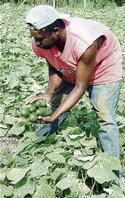

Left: A farmer reaps cucumber on a farm in Nain, St. Elizabeth. Right:
Veronica Davis, a small farmer from Free Hill, St. Ann, reaps carrots from her farm. Small farmers like Ms. Davis are expected to benefit from projects executed by the Agricultural Support Services Project. - Ian Allen/Staff Photographer
The Ministry of Agri-culture and Lands, through the Agricultural Support Services Project (ASSP), will be pumping some $75 million into three income-generating projects this fiscal year, to benefit 97 farmers in three parishes.
Audrey Wright, technical officer for the project, explained: "We selected a number of farmers who will be involved in three projects
at Amity Hall in St. Catherine, Ebony Park in Clarendon, and Spring-field in St. Thomas."
About 32 farmers are expected to benefit from the Amity Hall project, she noted. The project will involve the planting of sweet potatoes, scallion and peppers on about 80 hectares (200 acres) of land. "The capital cost there is going to be in the region of $32 million," Mrs. Wright said.
Another 35 farmers have been selected to plant pumpkin, peppers, dasheen and sweet peppers on about 100 to 120 hectares (250 to 300 acres) of land at a cost of about $26.8 million on the Ebony Park project. She said 30 others would be involved in the cultivation of honey dew melons and cantaloupe, at just under $17 million on the Springfield project.
"Our projects are very market-led as we do not encourage our farmers to go into production unless markets have been identified and contracts established with the buyer," the ASSP technical officer advised.
She said also that the farmers would be required to contribute to the projects as "every thing we do is on a cost-sharing basis."
Instituted in 2001 through funding from the Inter-American Development Bank (IBD) and the Government of Jamaica, the ASSP is designed to enhance the competitiveness of Jamaica's agriculture.
The project was originally estimated at US$31.5 million, but was adjusted to US$25.4 million, with US$17.8 million from the IDB and US$7.6 million from the Government of Jamaica.
Food safety policy
According to Mrs. Wright, the ASSP was initially designed as a four-year project, however, "We have obtained an extension in the timeframe for implementation and the project will now end in February 2008."
The ASSP has three components: strengthening the delivery of agricultural support services; strengthening and consolidating agricultural health and food safety services; and, financing selected activities in high pay-off productive projects.
In terms of strengthening agricultural health, Mrs. Wright says that Cabinet has approved the adoption of a food safety policy and the establishment of a food safety authority, to consolidate the services under by the Ministries of Agriculture and Lands; Health; and Industry, Technology, Energy and Commerce.
"This will be more efficient in reducing the overlaps and will be of better service to the agro processors and farmers in general," she indicates.
According to Mrs. Wright, "Food safety is very important to us as people need to eat safe food or to be sure that food is safe."
She said that the systems in place for food safety will provide for the monitoring of pesticide use in terms of the recommended dosage and times that should elapse between application of the pesticide and harvesting, what is sprayed, when it is applied, and "really trace the food right through the system."
She also pointed to the Hazard Analysis Critical Control Point (HACCP) programme, which "critically monitors the systems in the factories to ensure that the food that is produced by that factory is safe for consumption."
She emphasised that all of this "was becoming a part of international regulations under the World Trade Organisation, so we have to be able to do this."
Milestones
According to Mrs. Wright, the ASSP has achieved a number of milestones over the last five years, including improvements in crop production.
"We have a number of projects that are producing sweet potatoes and we see where the production and productivity of sweet potato has increased dramatically over the last few months. For example, the yields of sweet potatoes have increased from the norm of 8,000 pounds per acre to 14-15,000 pounds per acre," she says.
Through improved agronomic practices, including integrated pest management and drip irrigation systems, the cost of production has been reduced from $12 per pound to $8.40 per pound, she adds.
She boasted further of higher than average litter size and birth weight from the pig project at Bodles in St. Catherine and the development of two new varieties of high-yielding scallions. "We have increased productivity, with 32,000 pounds per acre from these new varieties and the new production practices, versus 10,000 to 15,000 pounds per acre, which the average scallion farmer gets," informs Mrs. Wright.
In addition, she said, "We have facilitated the All-Island Bee Farmers Association to set up a honey bottling plant based in Linstead and we have done a lot of training with the bee farmers and we have seen an increase in production."
- Audrey Wright
Technical officer for the project

